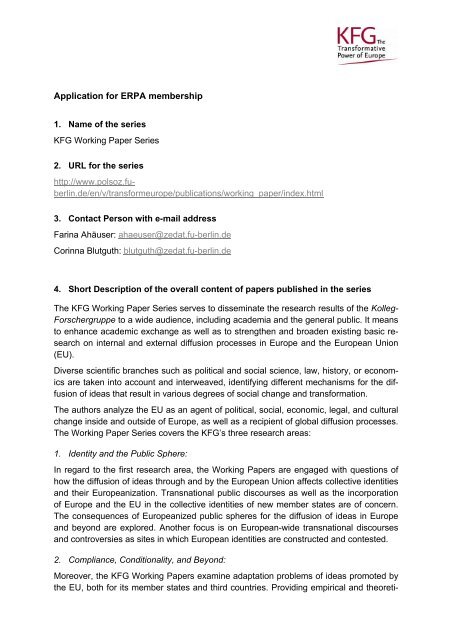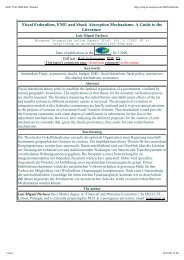Application for ERPA membership - EIoP
Application for ERPA membership - EIoP
Application for ERPA membership - EIoP
Create successful ePaper yourself
Turn your PDF publications into a flip-book with our unique Google optimized e-Paper software.
<strong>Application</strong> <strong>for</strong> <strong>ERPA</strong> <strong>membership</strong><br />
1. Name of the series<br />
KFG Working Paper Series<br />
2. URL <strong>for</strong> the series<br />
http://www.polsoz.fuberlin.de/en/v/trans<strong>for</strong>meurope/publications/working_paper/index.html<br />
3. Contact Person with e-mail address<br />
Farina Ahäuser: ahaeuser@zedat.fu-berlin.de<br />
Corinna Blutguth: blutguth@zedat.fu-berlin.de<br />
4. Short Description of the overall content of papers published in the series<br />
The KFG Working Paper Series serves to disseminate the research results of the Kolleg-<br />
Forschergruppe to a wide audience, including academia and the general public. It means<br />
to enhance academic exchange as well as to strengthen and broaden existing basic research<br />
on internal and external diffusion processes in Europe and the European Union<br />
(EU).<br />
Diverse scientific branches such as political and social science, law, history, or economics<br />
are taken into account and interweaved, identifying different mechanisms <strong>for</strong> the diffusion<br />
of ideas that result in various degrees of social change and trans<strong>for</strong>mation.<br />
The authors analyze the EU as an agent of political, social, economic, legal, and cultural<br />
change inside and outside of Europe, as well as a recipient of global diffusion processes.<br />
The Working Paper Series covers the KFG’s three research areas:<br />
1. Identity and the Public Sphere:<br />
In regard to the first research area, the Working Papers are engaged with questions of<br />
how the diffusion of ideas through and by the European Union affects collective identities<br />
and their Europeanization. Transnational public discourses as well as the incorporation<br />
of Europe and the EU in the collective identities of new member states are of concern.<br />
The consequences of Europeanized public spheres <strong>for</strong> the diffusion of ideas in Europe<br />
and beyond are explored. Another focus is on European-wide transnational discourses<br />
and controversies as sites in which European identities are constructed and contested.<br />
2. Compliance, Conditionality, and Beyond:<br />
Moreover, the KFG Working Papers examine adaptation problems of ideas promoted by<br />
the EU, both <strong>for</strong> its member states and third countries. Providing empirical and theoreti-
cal findings, questions regarding the influence of European ideas on politicaladministrative,<br />
economic, social and cultural institutions of nation-states within and outside<br />
the EU and the conditions fostering and retracting the diffusion of these ideas are<br />
researched.<br />
3. Comparative Regionalism and Europe’s External Relations:<br />
Working Papers focusing on the third research area are engaged with the European intent<br />
to promote regionalism and the development of genuine (intra-) regional economic<br />
and political cooperation, the building of issue-related regimes, and the creation of joint<br />
institutions <strong>for</strong> consultation and decision-making in the European neighborhood and<br />
world-wide. The effects of these ef<strong>for</strong>ts of diffusing regionalism, their perception by other<br />
actors and reactions to them are analyzed.<br />
5. Description of the editing institution<br />
The Kolleg-Forschergruppe is an interdisciplinary research college funded by the German<br />
Research Foundation. Founded in 2008, it is headed by two directors, Prof. Dr.<br />
Tanja A. Börzel and Prof. Dr. Thomas Risse, and supported by several high-ranking participating<br />
scholars from the Freie Universität Berlin, Humboldt Universität, the Hertie<br />
School of Governance and the University of Potsdam. Bringing together national and<br />
international competences on research related to Europe and the processes of diffusion,<br />
it institutionalizes cooperation with other universities and research institutions. The invitation<br />
of top senior and junior fellows as guest scholars creates the possibility to expand<br />
the expertise of the research college in the fields of law, sociology, and history. With its<br />
sabbatical program and its (post-) doctoral fellowships, the KFG provides its members<br />
the optimal environment and time <strong>for</strong> intensive research and theory development, as well<br />
as <strong>for</strong> a lively and critical exchange of ideas and opinions.<br />
Website: http://www.polsoz.fu-berlin.de/en/v/trans<strong>for</strong>meurope/index.html<br />
6. Description of the reviewing system<br />
The reviewing process comprises an internal and an external peer review, during which<br />
papers submitted <strong>for</strong> publication have to pass three different stages.<br />
As a first step of the internal review, the draft paper is presented to the Research College’s<br />
colloquium. The paper will be discussed by one of the College’s fellows or participating<br />
scholars, who is knowledgeable in the relevant field. Moreover, all fellows and<br />
visiting scholars are invited to participate in an open discussion and to provide recommendations<br />
and advice on further improvements.
After a subsequent revision by the author, the paper is sent to the KFG’s directors, Prof.<br />
Dr. Tanja A. Börzel and Prof. Dr. Thomas Risse, who critically review it, comment on it<br />
and provide additional suggestions and advice <strong>for</strong> amendments. Afterwards, the author is<br />
given the chance to read through (and comment on) the suggestions and revise his/her<br />
Working Paper accordingly.<br />
After having checked the revisions, the directors identify an independent, external reviewer<br />
affiliated with the Research College, who holds expertise or prominence in the<br />
pertinent subject area. An anonymous, double-blind reviewing process is applied. Critique,<br />
suggestions <strong>for</strong> modification and opinions on the paper are supplemented by further<br />
comments of the directors and remitted to the author, who incorporates the advice<br />
and criticism into the draft.<br />
The final decision about the publication of a paper lies with the research directors.<br />
The reviewing is followed by an editorial process. Readability and the compliance with<br />
scientific standards are checked in close collaboration with the author. Each paper is<br />
<strong>for</strong>matted to fit the publication style, editorial policy and corporate design of the Working<br />
Paper Series.<br />
7. Number of papers already published/Number of papers expected to be published<br />
annually<br />
2009:<br />
WP 1: The Trans<strong>for</strong>mative Power of Europe: The European Union and the Diffusion of<br />
Ideas (Tanja A. Börzel, Thomas Risse)<br />
WP 2: EU Administrative Conditionality and Domestic Downloading: The Limits of Europeanization<br />
in Challenging Contexts (Arolda Elbasani)<br />
WP 3: Neighbourhood Europeanization through ENP: The Case of Ukraine (Andrea<br />
Gawrich, Inna Melnykovska, Rainer Schweickert)<br />
WP 4: Bringing the Mass Media in: The Contribution of the Mass Media <strong>for</strong> Understanding<br />
Citizens' Attitudes towards the European Union (Silke Adam)<br />
WP 5: Structuring the European Administrative Space: Channels of EU Penetration and<br />
Mechanisms of National Change (Eva G. Heidbreder)<br />
WP 6: The Asymmetry of European Integration or why the EU cannot be a "Social Market<br />
Economy" (Fritz W. Scharpf)<br />
WP 7: Diffusing (Inter-) Regionalism: The EU as a Model of Regional Integration (Tanja<br />
A. Börzel, Thomas Risse)
WP 8: How European Protest Trans<strong>for</strong>ms Institutions of the Public Sphere: Discourse<br />
and Decision-Making in the European Social Forum Process (Nicole Doerr)<br />
WP 9: EU Democracy Promotion in the Mediterranean. Cooperation against All Odds?<br />
(Vera van Hüllen)<br />
2010:<br />
WP 10: Europe as a Symbolic Resource. On the Discursive Space of Political Struggles<br />
in Poland (Artur Lipiński)<br />
WP 11: The Trans<strong>for</strong>mative Power of Europe Reloaded: The Limits of External Europeanization<br />
(Tanja A. Börzel)<br />
WP 12: A New Society in the Making: European Integration and European Social Groups<br />
(Juan Díez Medrano)<br />
WP 13: How International Law Standards Pervade Discourse on the Use of Armed<br />
Force: Insights into European and US Newspaper Debates between 1990 and 2005<br />
(Swantje Ren<strong>for</strong>dt)<br />
WP 14: Unpacking the Compliance Puzzle. The Case of Turkey‘s AKP under EU Conditionality<br />
(Beken Saatçioglu)<br />
WP 15: The Emergence of a European Community of Communication: Insights from<br />
Empirical Research on the Europeanization of Public Spheres (Marianne van de Steeg,<br />
Thomas Risse)<br />
WP 16: Emotions, Media Discourse and the Mobilization of Citizens: Conceptual Considerations<br />
and a Plausibility (Marianne van de Steeg)<br />
WP 17: Do Regional Organizations Travel? European Integration, Diffusion and the Case<br />
of ASEAN (Anja Jetschke)<br />
WP 18: Post-Accession Conditionality: Support Instrument <strong>for</strong> Continuous Pressure? (Eli<br />
Gateva)<br />
WP 19: How European is European Identity? Extent and Structure of Continental Identification<br />
in Global Comparison Using SEM (Jochen Roose)<br />
WP 20: Networks, Courts and Regional Integration. Explaining the Establishment of the<br />
Andean Court of Justice (Osvaldo Saldías)<br />
WP 21: Democray and Legitimacy in the European Union Revisited: Input, Output and<br />
Throughput (Vivien Schmidt)
WP 22: Patterns of Power. The EU‘s External Steering Techniques at Work - The Case<br />
of Democratization Policies in Morocco (David Budde, Mathias Großklaus)<br />
2011:<br />
WP 23: Is There A Puzzle? Compliance with Minority Rights in Turkey (1999-2010)<br />
(Gözde Yilmaz)<br />
WP 24: Policy Matters But How? Explaining Non-Compliance Dynamics in the EU (Tanja<br />
A. Börzel/Tobias Hofman/Diana Panke)<br />
Papers expected to be published annually: 10 -15




